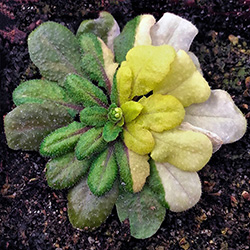ADAPTOMICS Teaching Module
 This programme is designed to train advanced students in disciplines and methodologies implemented in the ADAPTOMICS Research Priority Programme. It is based on experimental work and results generated through research activities of the ADAPTOMICS community. Module contents focus on hands-on skills and are targeted at a broad audience of third-year bachelor, master and starting PhD students. The ADAPTOMICS Teaching Module is modular in itself, consisting of independent experimental units that cover different areas of the SPP. Therefore it is transferable for future use by Universities within and outside the SPP.
This programme is designed to train advanced students in disciplines and methodologies implemented in the ADAPTOMICS Research Priority Programme. It is based on experimental work and results generated through research activities of the ADAPTOMICS community. Module contents focus on hands-on skills and are targeted at a broad audience of third-year bachelor, master and starting PhD students. The ADAPTOMICS Teaching Module is modular in itself, consisting of independent experimental units that cover different areas of the SPP. Therefore it is transferable for future use by Universities within and outside the SPP.
The first two parts (teaching kits) contain material and information for performing your own class in a molecular biology direction. Care was taken that the experiments can be conducted either individually or in groups of students within one week, using standard molecular biology equipment. All instructions are written in English.
The subsequent parts are independent experimental units, contributed by ADAPTOMICS principle investigators from their own teaching programs in the context of ADAPTOMICS.
TEACHING KIT: Epigenetic control of gene transcription FREE ORDER
Epigenetic (meaning “above genetics”) denotes heritable information that is not stored DNA sequence, but rather in chromatin – a complex of DNA with associated proteins, mostly histones. Histone modifications and DNA methylation function as context-dependent chromatin modifications in plants. Due to easy handling, low time requirements and no need for specialized technical equipment. The course focuses on the analysis of DNA methylation in diverse A. thaliana mutants under specific stress conditions. Experiments are chosen for easy handling and low time requirement, and they do not require specialized technical equipment. (by Dr. Ales Pecinka and Dr. Ines Kubigsteltig)
TEACHING KIT: Using CRISPR/Cas9 for site directed genome editing in plants FREE ORDER
 The CRISPR / Cas9 genome editing technology, which has recently been applied also in plant breeding, makes it possible to place site-directed mutations relatively easily and effectively in the genome. This module provides a full laboratory course with a toolkit for multiplex genome editing and premade CRISPR/Cas9 A. thaliana mutants affected in chloroplast biogenesis. The process of in vivo mutagenesis manifests itself in a surprising manner. The provided information can also serveas a guide for laboratories who would like to newly establish this technique for their own research.
(by Dr. Ines Kubigsteltig)
The CRISPR / Cas9 genome editing technology, which has recently been applied also in plant breeding, makes it possible to place site-directed mutations relatively easily and effectively in the genome. This module provides a full laboratory course with a toolkit for multiplex genome editing and premade CRISPR/Cas9 A. thaliana mutants affected in chloroplast biogenesis. The process of in vivo mutagenesis manifests itself in a surprising manner. The provided information can also serveas a guide for laboratories who would like to newly establish this technique for their own research.
(by Dr. Ines Kubigsteltig)
MODULE: Introduction into genome analysis and evaluation of NGS data
The aim of this course is to get to know the de novo sequencing and largely complete annotation of a plastid genome. Depending on the number of participants, different plant species are offered for processing (for example, ginkgo, Arabidopsis, carnations, St John's wort, ...). Individual sample data sets (NGS data), which were generated using 200-350 bp "insert libraries" using the Illumina HighSeq2000 technology, serve as the data source. The theoretical part of the course provides knowledge on the structure of simple genomes, on sequencing technology, as well as on the assembly and annotation of individual genes (Genius, CLC).
The course is part of our regular teaching program at Heidelberg University, and you may find it with the official teaching program (LSF). Depending on free slots you may register directly with us. User fees depend on individual status (student, PhD, PostDoc).
Location: Center for Organismal Studies, Heidelberg University | Contact: Dr. Markus Kiefer
Period: WS (October - February)
MODULE: Population Genetics Introductory Course
Population genetics seeks to describe the distribution of and the change in allele frequencies in natural and domestic populations. It attempts to explain evolutionary phenomena such as adaptation, differentiation, and speciation. This 6-weeks introductory course teaches PhD-Students all aspects of population genetics:
Biology in a nutshell - Sequencing technology - Statistical concepts - Statistical practice in R - Probability (week 1) / Drosophila genetics - Population genetics - PopGen problems (week 2) / - Population genetics - PopGen problems - Alignments, UNIX - Python & NGS analysis (week 3) / RNAseq - Phylogenetics - Introduction to the Coalescent - Neutrality Tests (week 4) / Population Structure - Clines - Evolution of sex chromosomes (week 6) / Quant. Genetics (week 6)
Location: Institut für Populationsgenetik, Vetmeduni Vienna |
Contact: Dr. Christian Schlötterer
Period: September
SLM*: Bioinformatic gene expression analysis using RNAseq data
This set of reference data and a commenting manual can be used to support the self-learning of bioinformatic applications. It teaches the practical use of next-generation sequencing data to investigate gene regulation at the transcriptome level.
SLM-download:Github
Contact: Dr. Björn Pietzenuk
*Self-learning material


